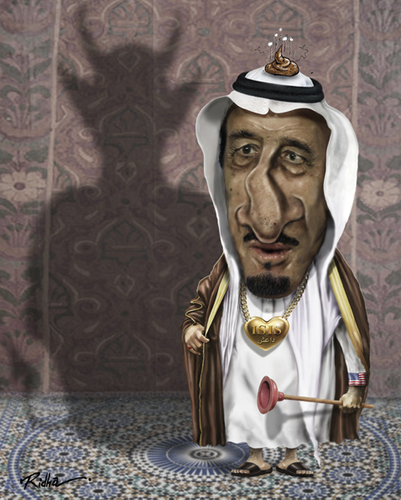NOVANEWS
Saudi succession struggle enters home stretch
King Shalom bin Yahood ‘Shoah’
By M K Bhadrakumar | Indian Punchline
Within hours of a decree by the Saudi King Salman bin Abdulaziz on Sunday announcing the constitution of a new committee to combat corruption under the chairmanship of the Crown Prince Mohammed bin Salman [MBS], an unprecedented purge of top establishment figures unfolded, signaling a pre-planned political campaign. The purge involves the sacking and/or detention of dozens of princes, ministers and former ministers. Several senior ministers, including those in charge of the kingdom’s National Guard, economy, and planning have also been dismissed. Notably, billionaire Prince Al-Waleed bin Talal is among those detained. The security forces grounded private jets in Jeddah to stop any high-profile figures from leaving the country.
King Salman’s decree invests the new anti-corruption committee with draconian powers. The decree says that the anti-corruption committee shall be exempted from “laws, regulations, instructions, orders and decisions”, while performing its tasks of identifying “offenses, crimes, persons and entities involved in cases of public corruption.” It empowers MBS to issue “arrest warrants, travel ban, disclosure and freezing of accounts and portfolios, tracking of funds, assets” as well as take “precautionary measures”.
Corruption is synonymous with oligarchies and the House of Saud is no exception. The Saudi way is traditionally to throw money at problems. Make no mistake that Saturday’s purge signifies another step in the no-holds-barred attempt by the 32-year old Crown Prince for consolidating absolute political power and paving the way for his ascension as the next ruler. Evidently, MBS intends to strike fear into the hearts of the elites who could be rival power centres when the time for succession arrives, which could be in a conceivable future as per indications.
An intriguing twist to the tale lies in the recent speech by MBS at a ceremony launching a $500 billion project on the Red Sea where he vowed to “destroy extremism” and return to a “a moderate Islam open to the world and all religions”. MBS was addressing an international audience and the speech was widely interpreted as an attempt to give a new face of Saudi Arabia aimed at the Western world, primarily, by pressing all the buttons that the West may like to hear pushed about entrepreneurship, liberalism, moderate Islam.
However, such a facile explanation is insufficient. For, there is indeed a contradiction insofar as the Saudi royal family has traditionally depended on backing from the ultra-conservative religious establishment to ensure its claim to legitimacy, while under MBS’s watch during recent months, the regime has begun implementing unprecedented economic and social reforms that might potentially undermine the regime’s deeply conservative power base. The noted Saudi editor and opinion maker Jamal Kashoggi told Deutsche Welle in a recent interview his explanation of what MBS is attempting:
“It is hard for Saudi Arabia to disown Wahhabism, seeing as how it created a hard-line Salafi current that has been in power for 30 years… I believe that the prince’s (MBS) social and economic reforms enjoy wide popular support and great momentum… The country needs to be freed from the hard-line Salafi approach that has been prevailing for 30 years with the state’s permission… Today, the carpet has been pulled from underneath this current’s feet, and it does not have the strength to prevent reform… On the other hand, there will always be Saudi hardliners who oppose those reforms… but they are not sufficiently powerful to prevent that march… It is hard to disown Wahhabism… it is the basis on which the Kingdom was built. But it can replace it with a centrist Islam… There are modern Islamic ideas available to the state, and it can use them without having to announce its disowning of Wahhabism.
Doesn’t it look like a Saudi-style “cultural revolution” where ideology and reform become the leitmotif of what is at the core a transition in the calculus of political power? By means of liberalizing rhetoric, MBS is on the one hand engaging the West and appeasing ordinary Saudis (and even sections of conservative clerics), while on the other hand also aiming to consolidate his and his father’s power by removing opposition voices. Arguably, they form two sides of the same coin.
Clearly, there is a foreign-policy angle to all this, which will impact regional security. The Saudi Crown Prince cannot do without American backing. (The former Crown Prince Mohammed bin Naif, rival to MBS who was ousted earlier this year, used to be Washington’s favorite as successor to King Salman.) Now, the exit of Lebanese Prime Minister Saad Hariri on Saturday is the latest telling evidence of a growing US-Saudi-Israeli congruence. A relatively stable set-up in Beirut (involving co-habitation between Hariri and Hezbollah), which acquitted itself remarkably well in the war against terrorist groups, has been suddenly thrown into disarray. What follows next in Lebanon dovetails into the US-Israeli-Saudi strategy toward post-ISIS Syria and Iraq where the balance of forces currently works in favor of Iran. Interestingly, Hariri announced his resignation in a speech broadcast from Saudi Arabia following a meeting with MBS. (Read the report in Tehran Times titled Hariri makes surprise resignation under Saudi pressure.)




